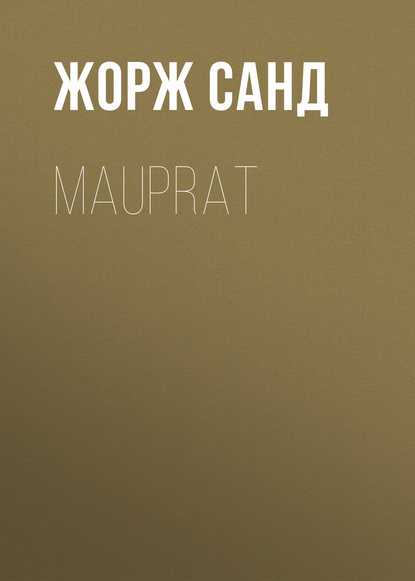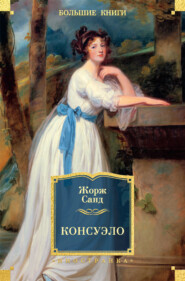По всем вопросам обращайтесь на: info@litportal.ru
(©) 2003-2025.
✖
Mauprat
Настройки чтения
Размер шрифта
Высота строк
Поля
This word “bogey” reminded me of the adventure which had brought me into far from friendly contact with Patience at the age of thirteen. Marcasse knew about it already, but he knew very little of my character at that time, and I amused myself by telling him of my wild rush across the fields after being thrashed by the sorcerer.
“This makes me think,” I concluded by saying, “that I have an imagination which easily gets overexcited, and that I am not above fear of the supernatural. Thus the apparition just now.”
“No matter, no matter,” said Marcasse, looking at the priming of my pistols, and putting them on the table by my bed. “Do not forget that all the Hamstringers are not dead; that, if John is in this world, he will do harm until he is under the ground, and trebly locked in hell.”
The wine was loosening the hidalgo’s tongue; on those rare occasions when he allowed himself to depart from his usual sobriety, he was not wanting in wit. He was unwilling to leave me, and made a bed for himself by the side of mine. My nerves were excited by the incidents of the day, and I allowed myself, therefore, to speak of Edmee, not in such a way as to deserve the shadow of a reproach from her if she had heard my words, but more freely than I might have spoken with a man who was as yet my inferior and not my friend, as he became later. I could not say exactly how much I confessed to him of my sorrows and hopes and anxieties; but those confidences had a disastrous effect, as you will soon see.
We fell asleep while we were talking, with Blaireau at his master’s feet, the hidalgo’s sword across his knees near the dog, the light between us, my pistols ready to hand, my hunting-knife under my pillow, and the bolts shot. Nothing disturbed our repose. When the sun awakened us the cocks were crowing merrily in the courtyard, and the labourers were cracking their rustic jokes as they yoked the oxen under our windows.
“All the same there is something at the bottom of it.”
Such was Marcasse’s first remark as he opened his eyes, and took up the conversation where he had dropped it the night before.
“Did you see or hear anything during the night?” I asked.
“Nothing at all,” he replied. “All the same, Blaireau has been disturbed in his sleep; for my sword has fallen down; and then, we found no explanation of what happened here.”
“Let who will explain it,” I answered. “I shall certainly not trouble myself.”
“Wrong, wrong; you are wrong!”
“That may be, my good sergeant; but I do not like this room at all, and it seems to me so ugly by daylight, that I feel that I must get far away from it, and breathe some pure air.”
“Well, I will go with you; but I shall return. I do not want to leave this to chance. I know what John Mauprat is capable of; you don’t.”
“I do not wish to know; and if there is any danger here for myself or my friends, I do not wish you to return.”
Marcasse shook his head and said nothing. We went round the farm once more before departing. Marcasse was very much struck with a certain incident to which I should have paid but little attention. The farmer wished to introduce me to his wife, but she could not be persuaded to see me, and went and hid herself in the hemp-field. I attributed this to the shyness of youth.
“Fine youth, my word!” said Marcasse; “youth like mine fifty years old and more! There is something beneath it, something beneath, I tell you.”
“What the devil can there be?”
“Hum! She was very friendly with John Mauprat in her day. She found his crooked legs to her liking. I know about it; yes, I know many other things, too; many things – you may take my word!”
“You shall tell me them the next time we come; and that will not be so soon; for my affairs are going on much better than if I interfered with them; and I should not like to get into the habit of drinking Madeira to prevent myself from being frightened at my own shadow. And now, Marcasse, I must ask you as a favour not to tell any one what has happened. Everybody has not your respect for your captain.”
“The man who does not respect my captain is an idiot,” answered the hidalgo, in a tone of authority; “but, if you order me, I will say nothing.”
He kept his word. I would not on any account have had Edmee’s mind disturbed by this stupid tale. However, I could not prevent Marcasse from carrying out his design; early the following morning he disappeared, and I learnt from Patience that he had returned to Roche-Mauprat under the pretence of having forgotten something.
XVIII
While Marcasse was devoting himself to serious investigations, I was spending days of delight and agony in Edmee’s presence. Her behaviour, so constant and devoted, and yet in many respects so reserved, threw me into continual alternations of joy and grief. One day while I was taking a walk the chevalier had a long conversation with her. I happened to return when their discussion had reached its most animated stage. As soon as I appeared, my uncle said to me:
“Here, Bernard; come and tell Edmee that you love her; that you will make her happy; that you have got rid of your old faults. Do something to get yourself accepted; for things cannot go on as they are. Our position with our neighbours is unbearable; and before I go down to the grave I should like to see my daughter’s honour cleared from stain, and to feel sure that some stupid caprice of hers will not cast her into a convent, when she ought to be filling that position in society to which she is entitled, and which I have worked all my life to win for her. Come, Bernard, at her feet, lad! Have the wit to say something that will persuade her! Otherwise I shall think – God forgive me! – that it is you that do not love her and do not honestly wish to marry her.”
“I! Great heavens!” I exclaimed. “Not wish to marry her – when for seven years I have had no other thought; when that is the one wish of my heart, and the only happiness my mind can conceive!”
Then I poured forth all the thoughts that the sincerest passion could suggest. She listened to me in silence, and without withdrawing her hands, which I covered with kisses. But there was a serious expression in her eyes, and the tone of her voice made me tremble when, after reflecting a few moments, she said:
“Father, you should not doubt my word; I have promised to marry Bernard; I promised him, and I promised you; it is certain, therefore, that I shall marry him.”
Then she added, after a fresh pause, and in a still severe tone:
“But if, father, you believe that you are on the brink of the grave, what sort of heart do you suppose I can have, that you bid me think only of myself, and put on my wedding-dress in the hour of mourning for you? If, on the contrary, you are, as I believe, still full of vigour, in spite of your sufferings, and destined to enjoy the love of your family for many a long year yet, why do you urge me so imperiously to cut short the time I have requested? Is not the question important enough to demand my most serious reflection? A contract which is to bind me for the rest of my life, and on which depends, I do not say my happiness, for that I would gladly sacrifice to your least wish, but the peace of my conscience and the dignity of my conduct (since no woman can be sufficiently sure of herself to answer for a future which has been fettered against her will), does not such a contract bid me weigh all its risks and all its advantages for several years at least?”
“Good God!” said the chevalier. “Have you not been weighing all this for the last seven years? You ought to have arrived at some conclusion about your cousin by now. If you are willing to marry him, marry him; but if not, for God’s sake say so, and let another man come forward.”
“Father,” replied Edmee, somewhat coldly, “I shall marry none but him.”
“‘None but him’ is all very well,” said the chevalier, tapping the logs with the tongs; “but that does not necessarily mean that you will marry him.”
“Yes, I will marry him, father,” answered Edmee. “I could have wished to be free a few months more; but since you are displeased at all these delays, I am ready to obey your orders, as you know.”
“Parbleu! that is a pretty way of consenting,” exclaimed my uncle, “and no doubt most gratifying to your cousin! By Jove! Bernard, I have lived many years in this world, but I must own that I can’t understand these women yet, and it is very probable that I shall die without ever having understood them.”
“Uncle,” I said, “I can quite understand my cousin’s aversion for me; it is only what I deserve. I have done all I could to atone for my errors. But, is it altogether in her power to forget a past which has doubtless caused her too much pain? However, if she does not forgive me, I will imitate her severity: I will not forgive myself. Abandoning all hope in this world, I will tear myself away from her and you, and chasten myself with a punishment worse than death.”
“That’s it! Go on! There’s an end of everything!” said the chevalier, throwing the tongs into the fire. “That is just what you have been aiming at, I suppose, Edmee?”
I had moved a few steps towards the door; I was suffering intensely. Edmee ran after me, took me by the arm, and brought me back towards her father.
“It is cruel and most ungrateful of you to say that,” she said. “Does it show a modest spirit and generous heart, to forget a friendship, a devotion, I may even venture to say, a fidelity of seven years, because I ask to prove you for a few months more? And even if my affection for you should never be as deep as yours for me, is what I have hitherto shown you of so little account that you despise it and reject it, because you are vexed at not inspiring me with precisely as much as you think you are entitled to? You know at this rate a woman would have no right to feel affection. However, tell me, is it your wish to punish me for having been a mother to you by leaving me altogether, or to make some return only on condition that I become your slave?”
“No, Edmee, no,” I replied, with my heart breaking and my eyes full of tears, as I raised her hand to my lips; “I feel that you have done far more for me than I deserved; I feel that it would be idle to think of tearing myself from your presence; but can you account it a crime in me to suffer by your side? In any case it is so involuntary, so inevitable a crime, that it must needs escape all your reproaches and all my own remorse. But let us talk of this no more. It is all I can do. Grant me your friendship still; I shall hope to show myself always worthy of you in the future.”
“Come, kiss each other,” said the chevalier, much affected, “and never separate. Bernard, however capricious Edmee may seem, never abandon her, if you would deserve the blessing of your foster-father. Though you should never be her husband, always be a brother to her. Remember, my lad, that she will soon be alone in the world, and that I shall die in sorrow if I do not carry with me to the grave a conviction that a support and a defender still remains to her. Remember, too, that it is on your account, on account of a vow, which her inclination, perhaps, would reject, but which her conscience respects, that she is thus forsaken and slandered.”
The chevalier burst into tears, and in a moment all the sorrows of the unfortunate family were revealed to me.
“Enough, enough!” I cried, falling at their feet. “All this is too cruel. I should be the meanest wretch on earth if I had need to be reminded of my misdeeds and my duties. Let me weep at your knees; let me atone for the wrong I have done you by eternal grief, by eternal renunciation. Why not have driven me away when I did the wrong? Why not, uncle, have blown out my brains with your pistol, as if I had been a wild beast? What have I done to be spared, I who repaid your kindness with the ruin of your honour? No, no; I can see that Edmee ought not to marry me; that would be accepting the shame of the insult I have drawn upon her. All I ask is to be allowed to remain here; I will never see her face, if she makes this a condition; but I will lie at her door like a faithful dog and tear to pieces the first man who dares to present himself otherwise than on his knees; and if some day an honest man, more fortunate than myself, shows himself worthy of her love, far from opposing him, I will intrust to him the dear and sacred task of protecting and vindicating her. I will be but a friend, a brother to her, and when I see that they are happy together, I will go far away from them and die in peace.”
My sobs choked me; the chevalier pressed his daughter and myself to his heart, and we mingled our tears, swearing to him that we would never leave each other, either during his life or after his death.
“Still, do not give up all hope of marrying her,” whispered the chevalier to me a few moments later, when we were somewhat calmer. “She has strange whims; but nothing will persuade me to believe that she does not love you. She does not want to explain matters yet. Woman’s will is God’s will.”
“And Edmee’s will is my will,” I replied.
A few days after this scene, which brought the calmness of death into my soul in place of the tumult of life, I was strolling in the park with the abbe.
“I must tell you,” he said, “of an adventure which befell me yesterday. There is a touch of romance in it. I had been for a walk in the woods of Briantes, and had made my way down to the spring of Fougeres. It was as warm, you remember, as in the middle of summer; and our beautiful plants, in their autumn red, seemed more beautiful than ever as they stretched their delicate tracery over the stream. The trees have very little foliage left; but the carpet of dried leaves one walks upon gives forth a sound which to me is full of charm. The satiny trunks of the birches and young oaks are covered with moss and creepers of all shades of brown, and tender green, and red and fawn, which spread out into delicate stars and rosettes, and maps of all countries, wherein the imagination can behold new worlds in miniature. I kept gazing lovingly on these marvels of grace and delicacy, these arabesques in which infinite variety is combined with unfailing regularity, and as I remembered with pleasure that you are not, like the vulgar, blind to these adorable coquetries of nature, I gathered a few with the greatest care, even bringing away the bark of the tree on which they had taken root, in order not to destroy the perfection of their designs. I made a little collection, which I left at Patience’s as I passed; we will go and see them, if you like. But, on our way, I must tell you what happened to me as I approached the spring. I was walking upon the wet stones with my head down, guided by the slight noise of the clear little jet of water which bursts from the heart of the mossy rock. I was about to sit down on the stone which forms a natural seat at the side of it, when I saw that the place was already occupied by a good friar whose pale, haggard face was half-hidden by his cowl of coarse cloth. He seemed much frightened at my arrival; I did my best to reassure him by declaring that my intention was not to disturb him, but merely to put my lips to the little bark channel which the woodcutters have fixed to the rock to enable one to drink more easily.
“‘Oh, holy priest,’ he said to me in the humblest tone, ‘why are you not the prophet whose rod could smite the founts of grace? and why cannot my soul, like this rock, give forth a stream of tears?’
“Struck by the manner in which this monk expressed himself, by his sad air, by his thoughtful attitude in this poetic spot, which has often made me dream of the meeting of the Saviour and the woman of Samaria, I allowed myself to be drawn into a more intimate conversation. I learnt from the monk that he was a Trappist, and that he was making a penitential tour.
“‘Ask neither my name nor whence I come,’ he said. ‘I belong to an illustrious family who would blush to know that I am still alive. Besides, on entering the Trappist order, we abjure all pride in the past; we make ourselves like new-born children; we become dead to the world that we may live again in Jesus Christ. But of this be sure: you behold in me one of the most striking examples of the miraculous power of grace; and if I could make known to you the tale of my religious life, of my terrors, my remorse, and my expiations, you would certainly be touched by it. But of what avail the indulgence and compassion of man, if the pity of God will not deign to absolve me?’

















